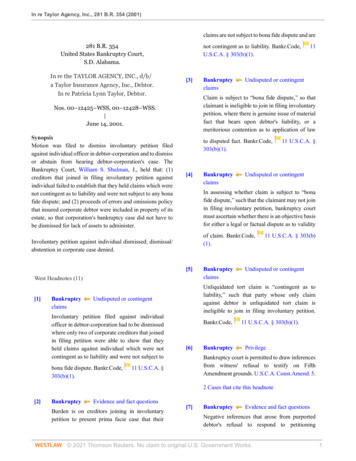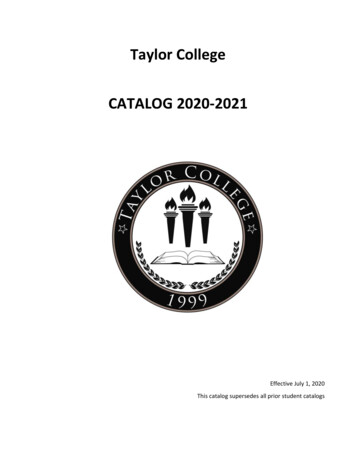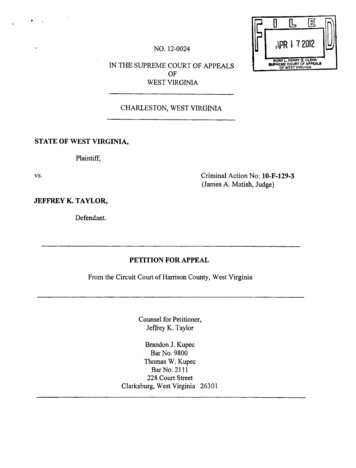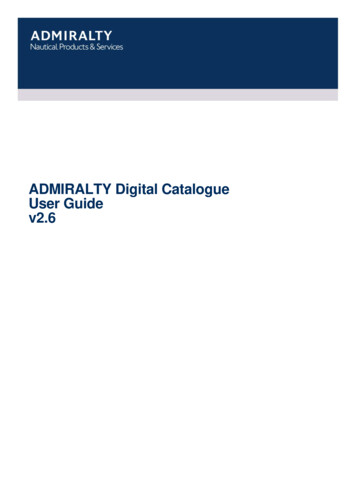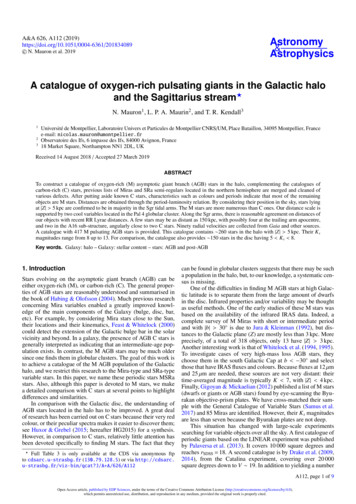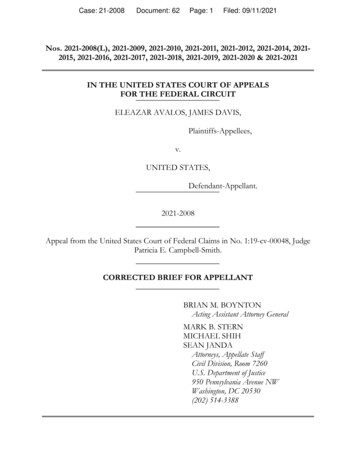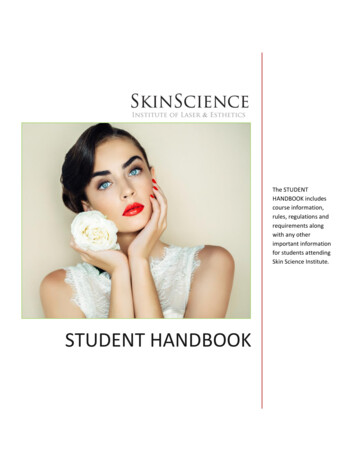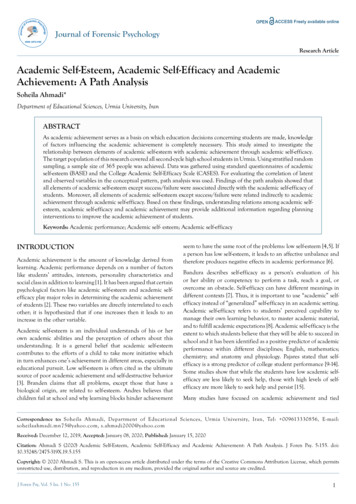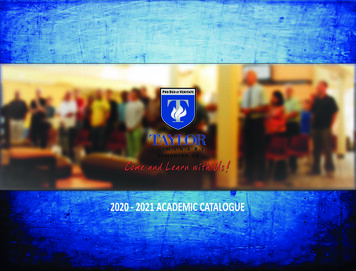
Transcription
S E M I N A R YEDMONTON, AB2020 - 2021 ACADEMIC CATALOGUE
Welcome to Taylor SeminaryTABLE OF CONTENTS2345681417182122293440WelcomeA Word from the PresidentA Word from the Academic DeanA Biographical Sketch of J. Hudson TaylorDoctrinal StatementIntroduction to the SeminaryAdmissions / RegistrationMap of CampusFinancial InformationStudent ServicesAcademic InformationPrograms of StudyCourse DescriptionsPersonnelCorrespondence DirectoryAll correspondence should be sent to the address below:Taylor Seminary11525 - 23 Avenue NWEdmonton, Alberta T6J 4T3Telephone: 780.431.5200 Toll free: 1.800.567.4988Fax: 780.436.9416(Canada only)Email: info@Taylor-Edu.caWebsite: www.Taylor-Edu.caWhenever possible, the specific office should be indicated on the envelope.Admissions (Entrance requirements, applications, programs, transfer credit)Phone: 1.800.440.6227 or 605.336.6588 Email: Admissions@TaylorEdu.ca or visit www.taylor-edu.ca “Quick Links”: “Request Information”Academic Advising/Financial AidPhone: 780.431.5207 Email: David.Williams@Taylor-Edu.caAcademic Dean (Curriculum and other academic matters)Phone: 780.431.8694 Email: Ralph.Korner@Taylor-Edu.caGeneral Office/Campus Facility Rentals/TranscriptsPhone: 780.431.5201 Email: Ai.Hayashizaki@Taylor-Edu.caS E M I N A R YAffiliated with the North American Baptist ConferenceAccredited by The Association of Theological SchoolsW E L C O M E T O TAY L O R S E M I N A R Y2
A Word from the PresidentThank you for selecting Taylor for the nextstep of your educational journey! We knowthat there are a lot of options for theologicaleducation and we are privileged that you haveselected Taylor.All of us at Taylor are deeply committed toresourcing you for whatever call God hasplaced on your life. People often assume thatseminary education is only for people with acall to vocational ministry. This is simply nottrue. People choose seminary education for awide variety of reasons; some because aspecificvocational calling, others want toDavid Williams, PhDexplorepossibilities for life's transitions, andPresidentothers because they want to know moreabout their faith. At Taylor, we have students with all kinds of different reasonsfor being here.People also often assume that seminary education is for those who have justgraduated from college or university. That also is not true. Most students atseminaries now don't come straight out of college. Taylor students are onaverage much closer to 40 than 22, have significant professional and lifeexperiences before coming to Taylor, and some are in some kind of transition intheir life journey. So, if that's you, you're in good company!Our mission at Taylor is “to develop Christ-minded leaders who make adifference in the world.” Here's a small part of what this means to us:“To develop .” Education is a process that moves someone from one place toanother. We recognize that everyone comes to seminary from different places,with different experiences, frameworks for understanding, theologicalcommitments, and a host of other differences. That's great! We find thatactually makes our journey together much more interesting. At Taylor, we startwhere you are to assist you in becoming what God has for you.“Christ-minded ” The goal of this educational journey is to have Christ formedin you (Gal 4:19). But our desire for you to have “the mind of Christ” (Phil 2:5ff)doesn't merely involve the way you “think.” Being “Christ-minded” involves theshape of one's whole life and one's whole way of being in the world. AtTaylor you will be challenged to have your whole life transformed, and thatincludes how you are formed spiritually, relationally, socially, as well asintellectually. Seminary education is Christian discipleship at its mostrigorous. You are in for quite a ride.“Leaders ” When we say “leaders” we think specifically of “servantleadership.” Servant leaders may have formal roles in organizations orgroups and when they do, they certainly need the appropriate skills,attitudes, and resources to faithfully accomplish that work. Or, one mayexpress servant leadership in other roles such as group members andfollowers, and there too are needed the appropriate skills, attitudes, andresources. So, whether you express leadership from in front of a group orfrom the back, your formation as a leader is central in what we are about.“To make a difference in the world.” It is impossible to be unaware that theworld in general and North America in particular is going throughmomentous change. In the midst of that changing world God has called us tobe salt and light (Matt 5:13ff). What an amazing time to live! As salt andlight, we go to the various places where God leads us with theannouncement of the redemptive love of God in Jesus. God is on a missionto redeem, reconcile, restore, and renew all of creation, and has called us tojoin in that task as well. As we do, God works for the transformation offamilies, neighbourhoods, cities, and nations into the life giving “shalom” forwhich they were created in the first place.This is a small glimpse into the journey on which you are embarked. We areglad that you are on it, and we are particularly glad that you are making thisjourney with us.Shalom,David Williams, PhDPresident, Taylor SeminaryProfessor of Theology and EthicsA WORD FROM THE PRESIDENT3
A Word from the Academic DeanRalph Korner, PhDAcademic DeanBy virtue of the fact that you have in your possessionthis Academic Catalogue, I assume that you aresensing a nudge from the Spirit of God towards someform of educational preparation for ministryinvolvement. Your journey likely involves manyquestions, perhaps questions like these:Why does Taylor Seminary exist?To develop Christ-minders leaders who make adifference in the world.What is a Christ-minded leader?A Christ-minded leader is one who is an integratedwhole of mind, body and spirit in their love for Godand others. Such a servant-leader expresses thatwholeness through the integration of at least sevendimensions: mental, physical, psychological,emotional, spiritual, social and societal.How does Taylor Seminary develop Christ-mindedleaders?I envision a holistically-integrated seminaryeducation as being one that is, among other things:theologically refined, philosophically attuned,academically grounded, socio-historically informed,pedagogically flexible, ecclesiastically focused (i.e.,serving the church), socio-culturally engaged,politically astute, multi-culturally sensitive, genderinclusive, morally attentive, transformationallyauthentic, spiritually deepening, emotionallyaffirming, collegially relational, personally rewarding,and financially affordable.How does Taylor Seminary seek to facilitate youreducational success?Taylor Seminary is committed to giving you all thetools necessary to succeed in your educational goals.Our course offerings are flexible enough toaccommodate those who cannot commit solely toon-site and/or daytime classes. Our commitment toacademic excellence is complemented by anemphasis on personal spiritual formation. Wecontinue to be in a review process with respect toour program offerings. One example is the centringof the MDiv degree upon the seven competencies ofa holistic minister of the Gospel. Our commitment toministry preparation for MDiv and MA students iswell-served through our internship, practicum, andsupervised ministry placements. Our desire tominimize the financial burden on students is realizedthrough the generous bursaries and scholarshipswhich are available. We warmly invite you toparticipate in becoming community together with us.Is God calling you to Taylor Seminary?If “yes,” I look forward to walking and talking astogether we move into God's future for you. If youaren’t sure, I invite you to come and talk with us andwalk our campus as you take one more step in aprocess of discernment. We look forward to servingyou in any way that we can to help encourage youfurther in your commitment to becoming a servantleader who brings the Kingdom of God into youreveryday world in lasting and life-changing ways.Ralph Korner, PhDAcademic DeanA WORD FROM THE ACADEMIC DEAN4
J. Hudson Taylor: “A Man in Christ”by Dr. Allan Effa, Ray and Edith DeNeui Professor of Intercultural StudiesJ. Hudson Taylor is one of the most recognized names inevangelical circles around the world. He is known as aman who lived by faith, trusted in the power of prayer,and mobilized a missionary force intent on reaching theentire nation of China. He was also a creative strategistwho pioneered an approach to missionary work thatcontinues to serve as a model for the evangelical missionenterprise into the 21st century.Taylor was born into the home of a devout Christianfamily in England in 1832. From an early age he not onlysensed a personal call to missionary work, but to thenation of China specifically. To prepare himself for thetask he disciplined himself by assuming an austerelifestyle in London while studying medicine and surgery,as well as Chinese, Latin, Greek and Hebrew.“A little thing is a littlething, but faithfulnessin little things is agreat thing.”– Hudson TaylorWhen other missionaries clung to their British ways,Taylor was convinced that the Gospel would only takeroot in Chinese soil if missionaries would affirm theculture of the people they were seeking to reach. Heargued, from the example of the Apostle Paul, “Let us ineverything unsinful become like the Chinese, that by allmeans we may save some.” Taylor’s progressive strategyinvolved the recruitment of candidates from a widevariety of denominational and national backgrounds, andthe acceptance of single female candidates as equalpartners in the Great Commission. His vision for reachingthe Chinese, along with his commitment to believer’sbaptism, engaged Baptists in the missions effort. NorthAmerican Baptist churches in the USA and Canada wereamong those who sent personnel to join efforts in thegrowing harvest in China. Within his own lifetime HudsonTaylor saw the missionary cadre under him grow to over800.After his death, China Inland Mission gained the notabledistinction of being the largest Protestant mission agencyin the world. Ruth Tucker summarizes hisaccomplishments in her book From Jerusalem to IrianJaya, “No other missionary in the nineteen centuriessince the Apostle Paul has had a wider vision and hascarried out a more systematized plan of evangelizing abroad geographical area than Hudson Taylor” (p.173).Billy Graham adds, “Few men have been used to touchChina for God as Hudson Taylor was. The principles ofsimple lifestyle, well-reasoned obedience, confidentprayer and patient endurance so clearly described in thisstory compel us to examine afresh what it means to be aman in Christ.” (Foreword in Roger Steer’s book, J.Hudson Taylor, A Man in Christ)Taylor Seminary is named in honour of this pioneeringcross-cultural worker.A B I O G R A P H I C A L S K E T C H O F J . H U D S O N TAY L O R5
Doctrinal Statement of NAB ConferenceThe following “Statement of Beliefs”was adopted by the North AmericanBaptist (NAB) Conference at itsTriennial session in Niagara Falls, NewYork, in 1982 and provides the basisfor doctrinal instruction at TaylorSeminary. Section 8 of this statementwas amended by delegates at the2009 Triennial in Winnipeg, MB.Baptists, since their beginnings,repeatedly have composedconfessions which expressed thedoctrinal consensus among relatedchurches. In principle, however,Baptists always have insisted that nostatement of faith can be consideredcreedally binding even uponconcurring congregations. Thepurpose of their doctrinal summarieswas to explain to other Christians andto the larger society what Baptistsbelieved and practiced. Within andamong Baptist churches, statementsof faith also provided a guide forinstruction, counsel and fellowship.NAB STATEMENT OF BELIEFSWe, as North American Baptists,presently feel the need to state morefully our Baptist understanding of theChristian faith. The purpose thatguided us in writing and the use thatwe intend for this declaration are:1. to further the sense of identityand the spirit of unity within ourNorth American Baptist Conferenceby declaring our common doctrinalunderstandings;2. to provide a basis for doctrinalinstruction within our conference;3. to provide a basis for doctrinaldiscussions in the hiring ofconference personnel;4. to serve as a reference pointwhen opinions differ;5. to provide a basis for doctrinaldiscussion in admitting newchurches and new pastors into ourvarious associations;6. to provide a doctrinal guide fornew churches; and7. to give a doctrinal witnessbeyond our conference.In continuity with our immediateforefathers and the larger fellowshipof Baptists throughout history, weseek to practice and propagate byGod’s grace the following convictions:1. We believe the Bible is God’s Wordgiven by divine inspiration, the recordof God’s revelation of Himself tohumanity (2 Timothy 3:16). It istrustworthy, sufficient, without error– the supreme authority and guidefor all doctrine and conduct (1 Peter1:23-25; John 17:17; 2 Timothy 3:1617). It is the truth by which Godbrings people into a savingrelationship with Himself and leadsthem to Christian maturity (John20:31; 1 John 5:9-12; Matthew 4:4; 1Peter 2:2).2. We believe in the one living andtrue God, perfect in wisdom,sovereignty, holiness, justice, mercyand love (1 Timothy 1:17; Psalm86:15; Deuteronomy 32:3-4). Heexists eternally in three coequalpersons who act together in creation,providence and redemption (Genesis1:26; 1 Peter 1:2; Hebrews 1:1-3).a. The Father reigns withprovidential care over all life andhistory in the created universe. Hehears and answers prayer (1Chronicles 29:11-13; Matthew7:11). He initiated salvation bysending His Son, and He is Father tothose who by faith accept His Sonas Lord and Saviour (1 John 4:9-10;John 3:16; John 1:12; Acts 16:31).b. The Son became man, JesusChrist, who was conceived of theHoly Spirit and born of the virginMary (John 1:14; Matthew 1:18).Being fully God and fully man, Herevealed God through His sinlesslife, miracles and teaching (John14:9; Hebrews 4:15; Matthew 4:2324). He provided salvation throughHis atoning death in our place andby His bodily resurrection (1Corinthians 15:3-4; 2 Corinthians5:21; Romans 4:23-25). Heascended into heaven where Herules over all creation (Philippians2:5-11). He intercedes for allbelievers and dwells in them astheir ever present Lord (Romans8:34; John 14:23).c. The Holy Spirit inspired men towrite the Scriptures (2 Peter 1:21).Through this Word, He convictsindividuals of their sinfulness and ofthe righteousness of Christ, drawsthem to the Saviour, and bearswitness to their new birth (James1:18; John 16:7-11; 1 Thessalonians1:5-6; Romans 8:16). Atregeneration and conversion, thebeliever is baptized in the HolySpirit (1 Corinthians 12:13). TheSpirit indwells, seals and givesspiritual gifts to all believers forministry in the church and society(Romans 8:9-11; Ephesians 1:1314; Romans 12:5-8; 1 Peter 4:10).He empowers, guides, teaches, fills,sanctifies and produces the fruit ofChrist-likeness in all who yield toHim (Acts 4:31; Romans 8:14; 1Corinthians 2:10-13; EphesiansD O C T R I N A L S TAT E M E N T6
5:18; 2 Thessalonians 2:13;Galatians 5:16, 22-23).3. We believe God created an order ofspiritual beings called angels to serveHim and do His will (Psalm 148:1;Colossians 1:16). The holy angels areobedient spirits ministering to theheirs of salvation and glorifying God(Hebrews 1:6-7; 13-14). Certainangels, called demons, Satan beingtheir chief, through deliberate choicerevolted and fell from their exaltedposition (Revelation 12:7-9). Theynow tempt individuals to rebelagainst God (1 Timothy 4:1; 1 Peter5:8). Their destiny in hell has beensealed by Christ’s victory over sin anddeath (Hebrews 2:14; Revelation20:10).4. We believe God created man in Hisown image to have fellowship withHimself and to be steward over Hiscreation (Genesis 1:26-28). As aresult, each person is unique,possesses dignity and is worthy ofrespect (Psalm 139:13-17). Throughthe temptation of Satan, Adam choseto disobey God; this brought sin anddeath to the human race andsuffering to all creation (Genesis 3;Romans 5:12-21; 8:22). Therefore,everyone is born with a sinful natureand needs to be reconciled to God(Romans 3:9-18,23). Satan temptspeople to rebel against God, eventhose who love Him (Ephesians 4:27;2 Corinthians 2:11; Matthew 16:23).Nonetheless, everyone is personallyresponsible to God for thoughts,actions and beliefs and has the rightto approach Him directly throughJesus Christ, the only Mediator(Romans 14:12; 1 Timothy 2:5).5. We believe salvation is redemptionby Christ of the whole person fromsin and death (2 Timothy 1:9-10; 1Thessalonians 5:23). It is offered as afree gift by God to all and must bereceived personally throughrepentance and faith in Jesus Christ (1Timothy 2:4; Ephesians 2:8-9; Acts20:21). An individual is united toChrist by the regeneration of the HolySpirit (Galatians 2:20; Colossians1:27). As a child of God, the believeris acquitted of all guilt and broughtinto a new relationship of peace(Romans 5:1). Christians grow as theHoly Spirit enables them tounderstand and obey the Word ofGod (2 Peter 3:18; Ephesians 4:15; 1Thessalonians 3:12).6. We believe the Church is the bodyof which Christ is the head and allwho believe in Him are members(Ephesians 1:22-23; Romans 12:4-5).Christians are commanded to bebaptized upon profession of faith andto unite with a local church formutual encouragement and growth indiscipleship through worship, nurture,service and the proclamation of theGospel of Jesus Christ to the world(Acts 2:41-42, 47; Luke 24:45-48).Each church is a self-governing bodyunder the lordship of Christ with allmembers sharing responsibility (Acts13: 1-3; 14:26-28). The form ofgovernment is understood to becongregational (Matthew 18:17; Acts6:3-6; 15:22-23). The ordinances ofthe church are baptism and the Lord’sSupper. Baptism is the immersion of abeliever in water in the name of theFather, and of the Son, and of theHoly Spirit (Matthew 28:18-20). It isan act of obedience symbolizing thebeliever’s identification with thedeath, burial and resurrection of theSaviour Jesus Christ (Romans 6:3-5).The Lord’s Supper is the partaking ofthe bread and of the cup by believerstogether as a continuing memorial ofthe broken body and shed blood ofChrist. It is an act of thankfuldedication to Him and serves to uniteHis people until He returns (1Corinthians 11:23-26). To expressunity in Christ, local churches formassociations and a conference formutual counsel, fellowship and amore effective fulfillment of Christ’scommission (Acts 15; 1 Corinthians6:1-3).7. We believe religious liberty, rootedin Scripture, is the inalienable right ofall individuals to freedom ofconscience with ultimateaccountability to God (Genesis 1:27;John 8:32; 2 Corinthians 3:17;Romans 8:21; Acts 5:29). Church andstate exist by the will of God. Each hasdistinctive concerns andresponsibilities, free from control bythe other (Matthew 2:21). Christiansshould pray for civil leaders, and obeyand support government in mattersnot contrary to Scripture (1 Timothy2:1-4; Romans 13:1-7; 1 Peter 2:1316). The state should guaranteereligious liberty to all persons andgroups regardless of their religiouspreferences, consistent with thecommon good.8. We believe Christians, individuallyand collectively, are salt and light insociety (Matthew 5:13-16). In aChrist-like spirit, they oppose greed,selfishness and vice; they promotetruth, justice and peace; they aid theneedy and preserve the dignity ofpeople of all races and conditions(Hebrews 13:5; Luke 9:23; Titus 2:12;Philippians 4:8-9; 1 John 3:16-17;James 2:1-4). We affirm the family asthe basic unit of society and seek topreserve its integrity and stability(Genesis 2:21-25; Ephesians 6:1-4).We believe the Bible teaches thatmarriage refers to the covenantrelationship exclusively between oneman and one woman, as instituted byGod in the beginning (Genesis 2:20b24; 1 Corinthians 7:2; Hebrews 13:4).9. We believe God, in His own timeand in His own way, will bring allthings to their appropriate end andestablish the new heaven and newearth (Ephesians 1:9-10; Revelation21:1). The certain hope of theChristian is that Jesus Christ willreturn to the earth suddenly,personally and visibly in gloryaccording to His promise (Titus 2:13;Revelation 1:7; 3:11; John 14:1-3).The dead will be raised, and Christwill judge mankind in righteousness(John 5:28-29). The unrighteous willbe consigned to the everlastingpunishment prepared for the deviland his angels (Matthew 25:41,46;Revelation 20:10). The righteous, intheir resurrected and glorified bodies,will receive their reward and dwellforever with the Lord (Philippians3:20-21; 2 Corinthians 5:10; 1Thessalonians 4:13-18).D O C T R I N A L S TAT E M E N T7
Introduction to the Seminary8Mission8Core Values8Priorities9Accreditation9DesignatedLearning Institution9Affiliations9Sioux Falls Seminary9Urban Sanctuary9Location10 Facilities11 History of Taylor SeminaryMissionThe mission of Taylor Seminary is.to develop Christ-mindedleaders who make a differencein the world.Taylor Seminary seeks to achievethis mission by providinggraduate-level theologicaleducation for men and womenwho are committed to obey theLord in career, church andcommunity. Our primary focus ison training for pastoral andvocational Christian ministries. Wealso prepare those who are calledto serve as intentional disciples ofChrist in the market-place andsociety. We perform this ministrywithin a context that is bothBaptist and evangelical. Toaccomplish this, the seminaryseeks:1. to give students a foundationalknowledge of Scripture and theChristian heritage,2. to help them develop skills tominister the grace of Godwherever He may lead them,3. to cultivate in them a faith inGod which not only will sustainthem in joy and disappointmentbut will attract others to asimilar reliance and obedience,and,4. to set them confidently on apath in which their knowledge,skill, and faith will developthroughout a lifetime ofeffective and generous serviceto God and His kingdom.Core ValuesAt Taylor Seminary, we arecommitted to:1. Evangelical convictions.2. Spiritual and characterformation.3. Transformational learning.4. Wise stewardship.5. Life-long servant leadership.6. Collaborative partnerships.7. Cultural diversity.PrioritiesTheological UnderstandingGrowth in theologicalunderstanding is of paramountimportance at Taylor Seminary. Allprograms of study requireintensive study of the Scripturesand of the rich theologicalheritage of the Church. Studentsare encouraged to deepen theirunderstanding of the Christianfaith and to develop theologicalconvictions which are wellfounded. At the same time, theyare encouraged to be open towhat is of value in varioustheological traditions and to becommitted to ongoing growth.Spiritual DevelopmentThe cultivation of a healthyspiritual life also receives majoremphasis at the seminary. Inaddition to classroom instructionon spiritual formation, studentsare given many opportunities forindividual and corporate worshipand spiritual enrichment. Retreats,chapel services and times set asidefor prayer are provided to fosterspirituality, and spiritual directionis offered through UrbanSanctuary. Spiritual growth cannotbe legislated or programmed, butsignificant effort is made tonurture it. Professors and studentsalike need continual spiritualrenewal, and Taylor SeminaryINTRODUCTION TO THE SEMINARY8
offers an environment which isconducive to this.MinistryA third priority at Taylor Seminaryis the equipping of students tocontribute to the Church’smission. Every faculty member isdeeply committed to the task ofreconciling the world to Christ andseeks to instill in students a similarcommitment. A wide array ofcourses and a flexible program ofsupervised ministry and internshipis designed to prepare students toparticipate as effectively aspossible in the extension of God’skingdom. All are encouraged todevelop and exercise their Godgiven gifts to the glory of God.DesignatedLearning InstitutionAccreditationTaylor Seminary is affiliated withthe North American BaptistConference (NAB) and isauthorized by the Conference togrant theological degrees. As anagency of the NAB Conference,Taylor Seminary is committed topreparing people for ministry inNAB churches, particularly in theCanadian context. This distinctiveindicates the perspective fromwhich theological education isoffered to students of differentdenominational backgrounds.The seminary cooperates withother organizations in the work ofTaylor Seminary is accredited bythe Commission on Accrediting ofThe Association of TheologicalSchools in the United States andCanada (ATS).*ATS has approved the followingdegree programs at TaylorSeminary:? Master of Divinity? Master of Theological Studies? Master of Christian Ministries*Association of Theological Schools10 Summit Park DrivePittsburgh, Pennsylvania 15275-1103Taylor Seminary is a DesignatedLearning Institution (DLI) inAlberta, Canada, and is eligible toreceive foreign nationals on astudy permit. Upon acceptancethese students are issued anInternational Letter of Acceptancewith the appropriate DLI numberwhich lets them apply toImmigration, Refugees andCitizenship Canada (IRCC) for astudy permit.Affiliationstheological education, withcooperating agreements withVanguard College, UrbanSanctuary (both of Edmonton, AB)and Prairie College (Three Hills,AB). Partnership agreements arein place with Sioux Falls Seminary,Evangelical Seminary (Myerstown,PA) and Cameroon BaptistTheological Seminary.The seminary is an institutionalmember of: the EvangelicalFellowship of Canada, theCanadian Corporation for Studiesin Religion, the Association forTheological Field Education,Educational Consortium forContextual Learning (ecCL),Alberta Consortium for SupervisedPastoral Education and ChristianHigher Education Canada (CHEC).Sioux Falls SeminaryTaylor Seminary works inpartnership with itsdenominational sister seminary,Sioux Falls Seminary in Sioux Falls,SD. Through this partnership,students at Taylor Seminary may,if they choose, participate incourses offered through SiouxFalls Seminary.Urban SanctuaryUrban Sanctuary is TaylorSeminary’s partner for spiritualformation services, includingteaching, spiritual direction andother related services. Whilespiritual direction is required forthe Supervised Ministry program,Urban Sanctuary makes itavailable to all Taylor students at asubsidized cost. For theconvenience of students, UrbanSanctuary makes all spiritualdirection sessions available oncampus.LocationTaylor College and Seminary islocated in south Edmonton alonga beautiful ravine that forms partof the city’s river valley parksystem. Situated on 23rd Avenuea few minutes west of GatewayBoulevard and just north of theAnthony Henday ring road, theschool is easily accessible fromany part of the city and is locatedvery close to the LRT route.Edmonton is among the majorpopulation centres in Canada andis the northernmost major city inNorth America. It is locatedapproximately in the middle ofAlberta, straddling the NorthINTRODUCTION TO THE SEMINARY9
Saskatchewan River in a rich,rolling evergreen setting ofparkland surrounded byproductive arable land.Edmonton boasts a rich mixture ofethnic cultures. The WinspearCentre, the Citadel Theatre, theArt Gallery of Alberta, the RoyalAlberta Museum, the University ofAlberta, and other institutionsoffer a stimulating cultural andeducational climate. Professionalfootball, hockey, and baseballteams also provide entertainmentfor the sports enthusiast.Edmonton is easily accessible byroad, rail, or air transportation.space is located in Benke Hall nearthe faculty offices, and open whenclasses are in session. Other studyspace and shared computers arealso available.FacilitiesTaylor Seminary is located on abeautiful tree-lined campus insouth Edmonton. The seminary ishoused in the newest building oncampus. It includes twoclassrooms, a common area,prayer room, kitchen, offices and alecture theatre called Stencel Hall.The Schalm Memorial LibraryCollection is a shared resourcewith Vanguard College and ishoused on the Vanguard campus.The Taylor campus maintains areading room, stocked withtextbooks, frequently-used booksand reference materials, as well asshared computers; this studentINTRODUCTION TO THE SEMINARY10
A History ofTaylor Collegeand SeminaryTaylor College and SeminaryFounded: 1940 (established as‘Christian Training Institute’)Founder: Rev. Dr. Emil P. WahlStudent Body: 100 (approx.)THE EARLY YEARSTaylor Seminary represents over75 years of the community ofNorth American Baptist churchesresponding faithfully to thechanging educational demands ofthe church and society. Theestablishment of Taylor Seminaryis rooted in a large number oflocal area "Christian traininginstitutes" established in 1923that were widely dispersed acrossthe western prairies. Theseinstitutes appealed to many ruralyoung people during the longprairie winters, and providedtrained lay leadership for the localchurches as well as opportunitiesfor young people to utilize theirtime wisely. Sessions were held invarious local churches, engaging anumber of area pastors asteachers, and attracting youngpeople from the surrounding areawho attended these sessions forperiods of one to six weeks.Several earlier attempts weremade to establish a morepermanent residential school forNorth American Baptist churches,but these failed to come tofruition. Finally, at the annualsessions of the NorthernConference meeting at Olds,Alberta, in June of 1938, acommittee was appointed to planand direct building facilities. Thisproject was endorsed by theNorthern Conference churches(Alberta, Saskatchewan, andManitoba) of the North AmericanBaptist Conference in July of 1939.A residential school began withthe financial support of andvolunteer labour from individualswithin
Welcome to Taylor Seminary S E M I N A R Y Correspondence Directory All correspondence should be sent to the address below: Taylor Seminary 11525 - 23 Avenue NW Edmonton, Alberta T6J 4T3 Telephone: 780.431.5200 Toll free: 1.800.567.4988 Fax: 780.436.9416 (Canada only) Email: info@Taylor-Edu.ca Website: www.Taylor-Edu.ca
